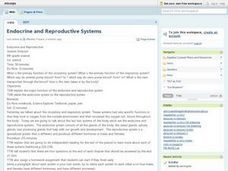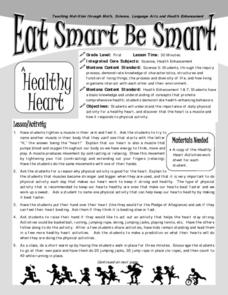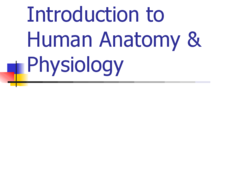Curated OER
Blood
Although there are vocabulary terms in this PowerPoint that use British spelling, the presentation is attractive and educational. The content flows from the general composition of blood, into the different types of blood cells and their...
Curated OER
Human Organ Systems
In this human organ systems worksheet, students write the organ system that is described in the first 5 sentences. Students match the body parts to the organ system and write them in the chart.
Maryland Department of Natural Resources
Eyes on Dissolved Oxygen
Learn about the factors that affect the way oxygen dissolves in salt water with a chemistry lab. After studying the molecular structure of water, young scientists figure out how aeration, temperature, and organic waste affect dissolved...
Curated OER
Mapping the Circulatory System
Students investigate the circulatory system in human beings. In this human body lesson, students create an outline of a human body using colored markers and butcher paper. Students use red and blue colors to simulate the oxygenated...
Curated OER
Take A Heart Hike
Students investigate the functions of different body systems. They conduct research about the major body systems to attain information. The teacher prepares the room for the lesson. Students walk and talk through each major system as...
Curated OER
The Discovery of OXygen
Students conduct experiments to identify the different properties of oxygen. For this chemistry lesson, students examine its importance to life on Earth. They explore the historic dispute about oxygen's discovery.
Curated OER
The Human Eye
In this reading comprehension worksheet, students learn about the human eye by reading a 2 page passage and studying a diagram of the eye. Students answer 8 questions, and label a diagram of the eye.
Curated OER
Ten Questions About The Human Body
In this human body worksheet, students complete a set of 10 questions, answering in space provided. Worksheet has a link to additional activities.
Curated OER
Body and Blood
Students explore the cardiovascular system. Through the use of video, students observe the heart pumping an oxygen-enriched blood supply through arteries to the muscles in use during exercise. They participate in activities to explore...
Curated OER
AP: Chapter 42: Circulation & Gas Exchange
Immerse biology learners in circulation and gas exchange for both simple organisms and higher animals. Six pages of short-answer questions and labelling of the human respiratory system are included. This assignment was written for an...
Curated OER
Endocrine And Reproductive Systems
Young scholars investigate the hormonal levels that are created with the endocrine system and tie it to the act of sexual reproduction. The lesson discusses how the respiratory system is organized as a comparison to the endocrine system...
Montana Office of Public Instruction
Eat Smart Be Smart
Get children's blood pumping with this primary grade lesson on the human heart. After learning about the important role this muscle plays in the human body, students monitor their heart rates and discover the importance of staying active.
Curated OER
Introduction to Human Anatomy & Physiology
If the only support you are in search of is lists of vocabulary terms, this presentation may fit the bill. Slides simply list terminology. These categories are included: hierarchy of structural organization, cell functions, cell...
Curated OER
Introduction of the Human Heart
Fifth graders make their observations about the structure of the human heart. Students trace the flow of blood through the human heart. They touch a model of the human heart, 5th graders read aloud a handout that is found in their...
Serendip
How Do Muscles Get the Energy They Need for Athletic Activity?
Every muscle movement requires energy, but where does that energy come from? Scholars answer this question and more as they complete a worksheet. By following the directions, completing research, and discussing it as a class, they begin...
Serendip
Food, Energy and Body Weight
High schoolers learn why humans need calories, how they control weight with food choices, and the impact of exercise on energy. Scholars then apply their understanding to a case study of lunch choices and exercise.
Curated OER
Healthy Field Day
Hosting a Healthy Field Day will take a lot of planning and organization, but with a lot of parent participation it can come together very well. The resource describes seven stations of the ten that were presented. Each of these has a...
Curated OER
Human Excretion: Living Environment
A solid review of the excretion system that presents diagrams and asks learners to name the labelled parts or to identify which parts perform the particular jobs stated.
Curated OER
The Human Heart: An Introduction
Fifth graders view a transparency of the human heart and answer questions based on their observations. They read pages from their textbook and discuss the information presented. They visit a website to view the human heart and create a...
Forest Foundation
The Nature of Trees
Young botanists examine the different parts of tress and then draw parallels between the functions of these parts and the function of parts of the human body.
Curated OER
Heart Facts
In this heart facts worksheet, 4th graders fill in the missing words to complete 9 sentences about the anatomy and functions of the human heart. This worksheet could be used in many ways; as a web quest, anatomy book word hunt, or with a...
Curated OER
Body Systems
Students view a video, they summarize the function or job of each body system. They are asked why is it important that athletes in training or a person who wants to tone muscles or stay healthy should comprehend how the systems could...
Curated OER
The Magic School Bus Works Out
Students learn along with Ms. Frizzle's class. In this Magic School Bus lesson plan, students make a personal heart profile of an important member of their own hardworking team.
Curated OER
The Science of Respiration and Blood Circulation
Fifth graders study how respiration and circulation are connected. In this respiratory lesson students complete several activities to better understand heart rate and carbon dioxide in the body.

























